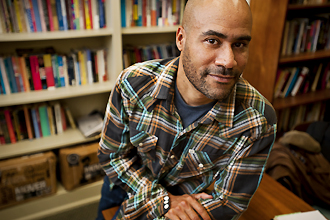New Orleans music tied to tourism economy
From bounce music to the Mardi Gras Indians to second-line parades and brass bands, black performance culture in New Orleans has a long and evolving history in the city, one with an interesting relationship to tourism. The “conspicuous consumption” of New Orleans black culture has, however, assumed heightened visibility post-Katrina, says assistant professor Marc Perry.

Marc Perry, assistant professor of anthropology and African and African Diaspora studies, is advancing research on black performance culture in New Orleans. (Photo by Paula Burch-Celentano)
Perry has a dual appointment in anthropology and African and African Diaspora studies.
Prior to turning his attention to New Orleans, Perry examined Cuba's transition from revolutionary socialism to free-market capitalism through the vantage point of Cuban hip-hop music. In his University of Texas dissertation (2004) and a book recently submitted to Duke University Press, Perry explores how hip-hop relates to social transformation in Cuba.
Free-market neoliberalism is a global trend, Perry says. But related forms of deregulation have intensified in New Orleans after the Katrina crisis. He points to the dismantling of public housing, the chartering of public schools and the shuttering of Charity Hospital as examples of the kinds of structural economic changes the city has experienced under neoliberal shifts.
“New Orleans is a fascinatingly complex place at a fascinatingly complex time right now,” says Perry.
Yet, while it has “its own unique history that sets it somewhat apart from the United States, the kinds of struggles that are going on here are going on everywhere else.”
In his second year at Tulane, Perry is a 2011â“12 Monroe Fellow with the New Orleans Center for the Gulf South. The fellowship is providing seed money for Perry's current New Orleans research. He also is developing a new course on black music and performance in New Orleans for the proposed new coordinate major on musical cultures of the Gulf South.
